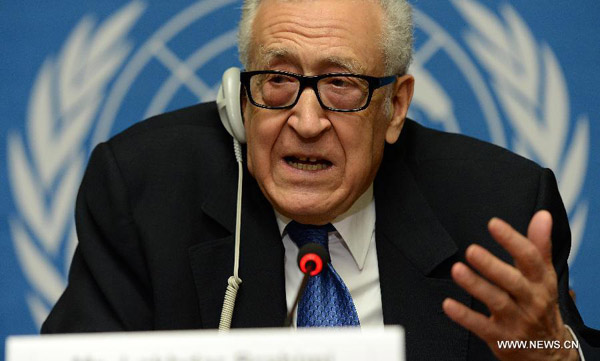 |
| Lakhdar Brahimi, UN-Arab League Special Envoy to Syria, speaks to media in Geneva, Switzerland, on Feb. 15, 2014. The second round negotiations of the Geneva II international conference on Syria concluded on Saturday noon without achieving tangible results, said UN-Arab League Special Envoy to Syria Lakhdar Brahimi. (Xinhua/Wang Siwei) |
Highlights
• The second round of Syria talks concluded on Saturday noon without achieving tangible results.
• Brahimi said a proposed agenda for the next round of talks was agreed between the two Syrian sides.
• The special envoy hoped that each side "goes back and reflect and take their responsibility".
GENEVA, Feb. 15 (Xinhua) -- The second round negotiations of the Geneva II international conference on Syria concluded on Saturday noon without achieving tangible results, said UN-Arab League Special Envoy to Syria Lakhdar Brahimi.
Brahimi said a proposed agenda for the next round of talks was agreed between delegates of the Syrian government and the opposition, but did not reveal the exact date.
Addressing a press conference in the wake of the "laborious" last session held Saturday morning, he said an agenda for the next round of "when it does take place" was accepted by both sides.
The four-point agenda included fighting violence and terrorism, the transitional governing body, national institutions, and as well as national reconciliation and national debate, according to Brahimi.
Brahimi suggested that during the new round, the first day would be reserved for discussions over fighting against violence and terrorism, and the second day about the transitional governing body.
But the special envoy noted that the specific negotiating time-length devoted to respective item remained a sticking point.
He said that the Syrian government delegation accepted the agenda, but refused the suggested time-length of discussions on stopping the violence and terrorism and insisted on moving to the second item only when the first one was finished.
Brahimi said that this position "raises the suspicion of the opposition that the government did not want to discuss the transitional governing body."
The special envoy hoped that each side "goes back and reflect and take their responsibility."
"I very, very much hope that the two sides will reflect and think a little bit better and come back ready to engage seriously on how to implement the Geneva Communique," he said.
"The Geneva Communique is not an end in itself and The Geneva Communique helps the two sides, and us sitting between them, to start the long road towards ending this crisis," he added.
The mediator for the peaceful talks said that he himself would brief United Nations Secretary General Ban Ki-moon, possibly also the permanent members of the U.N. Security Council and the Security Council as a whole, on the talks.
He also noted the need to hold discussions with Russia and the United States, the two initiating nations for the Geneva II conference.
As for the possible third round of peace talks with no date set yet, the mediator said that he hoped there will be one, the earlier the better.
"Everybody needs to go back to their base and we will contact each other to determine the coming date," said Brahimi.
Bashar Ja'afari, head of Syrian government delegation, said his delegation accepted the agenda, but the problem was raised when the opposition "gave their own interpretation of the agenda by saying that there is no need to fully finalize the first item," ie the stopping of violence and terrorism in conflict-torn Syria.
"We promise to our people to come back to Geneva, and to continue Geneva talks as long as it takes," said the senior Syrian official, reiterating their commitment "to stopping bloodshed" and "combating terrorism."
On the other hand, Louay al-Safi, spokesman of the opposition delegation, said that there were no "positive" results of the talks that concluded Saturday.
He accused the other side of having "focused on one track" and "tried to divert us from the main issues."
After the first round of Geneva II negotiations between the delegations of Syrian government and the opposition mediated by Brahimi adjourned some ten days ago without achieving concrete results, the second round started here on Monday morning.
But the two rounds of Syria peaceful talks have not seen rift healed.
The government side insisted on taking the stopping of violence and terrorism as a top priority, while the opposition focused on establishing a transitional governing body with full executive authority and without the presence of Syrian President Bashar al-Assad.
On Thursday, Brahimi, Russian Deputy Minister of Foreign Affairs Gennady Gatilov and U.S. Under Secretary of State Wendy Sherman held a two-hour long trilateral meeting in an effort to push forward the stalled Syrian peace talks.
The two initiating countries for Geneva II conference promised to "unblock the situation" and revivify the peaceful process, said Brahimi on Thursday.
But to date no progress has been witnessed, and the two sides hurled reproaches at each other over the gridlock.
The first round of the UN-backed Geneva II international conference started with a ministerial meeting chaired by Ban Ki-moon on the first day, which was then followed by the face-to-face negotiations between delegations of the Syrian government and the opposition mediated by Brahimi.
It was the first time in three years that representatives from the two warring sides met with each other.
The two sides agreed to hold negotiations under the framework of the Geneva Communique, adopted in 2012, but they were still far apart in their approach to talks.
 Highlights of opening ceremony of Sochi 2014 Winter Olympic Games
Highlights of opening ceremony of Sochi 2014 Winter Olympic Games Highlights of Chinese New Year celebrations around the world
Highlights of Chinese New Year celebrations around the world  Chinese ship formation conducts live fire training in West Pacific
Chinese ship formation conducts live fire training in West Pacific Sanya bans skinny dipping in public beach
Sanya bans skinny dipping in public beach Top 20 most beautiful Chinese stars
Top 20 most beautiful Chinese stars  PLA navy conducts landing drills in South China Sea
PLA navy conducts landing drills in South China Sea  Snowscape in Chinese New Year
Snowscape in Chinese New Year Top 10 timeless female Chinese stars
Top 10 timeless female Chinese stars Top 10 Chinese films in 2013
Top 10 Chinese films in 2013 Ruins of Shang Dynasty's structure unearthed in Shaanxi
Ruins of Shang Dynasty's structure unearthed in Shaanxi  Intercity high speed train in operation for the first
Intercity high speed train in operation for the first  Severe coldness freezes large parts of China
Severe coldness freezes large parts of China  Beautiful moments of Sochi
Beautiful moments of Sochi  It's not just performing this year
It's not just performing this year Selfies of "Little colorful flag" girl unveiled
Selfies of "Little colorful flag" girl unveiled Day|Week|Month